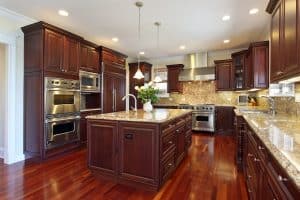
When designing or remodeling your kitchen, one of the key elements that influence not only the look but the functionality of the space is the height of your countertops. While it might seem like a small detail, the height of your counters can impact everything from your comfort while cooking to the overall flow and feel of the kitchen. So, what should the height of your countertops be, and what factors should you consider before making this important decision?
Let’s dive into the elements that might influence your countertop height and why choosing the right height is crucial for your kitchen’s functionality and comfort.
Industry Standards: The 36-Inch Rule
Most standard countertops are 36 inches tall. This is the height that most prefabricated countertops and cabinets are designed to fit, as it has been established as the industry standard. Here’s a quick breakdown of how this measurement works:
- Base Cabinets: These typically measure around 34.5 inches in height.
- Countertops: The countertops themselves typically add about 1.5 inches in thickness.
- Total Height: When combined, the countertop height comes out to 36 inches from the floor.
Why 36 inches? Historically, this height was chosen because it sits at roughly one-third of the height of a standard 9-foot ceiling. It’s a height that accommodates most people comfortably when standing and working in the kitchen, making it the go-to measurement for standard kitchen countertops.
Standard Bar-Height Countertops
If you’re planning to include a bar or an elevated seating area in your kitchen, the standard height for bar counters is usually 42 inches. This gives enough clearance for most barstools to fit underneath, creating a comfortable space for casual dining or entertaining.
But while these standard heights are great for many households, it’s important to consider your specific needs. The “one-size-fits-all” approach may not work for everyone.
When to Deviate from Standard Heights
While 36 inches may be the norm, there are several reasons you might consider deviating from this standard. Countertops should work for you, not the other way around. Here are a few factors to consider that may prompt you to adjust the height of your countertops.
Accommodating Different Heights
We all know that people come in different shapes and sizes. If you or someone in your household is significantly taller or shorter than average, standard countertop heights might not be the most comfortable option. Here’s how you can adjust:
- For Taller Individuals: If you’re taller than average, you may find yourself constantly bending over while chopping vegetables or washing dishes at a 36-inch counter. This can cause discomfort and strain over time. Raising the countertop height to 38 or 39 inches can alleviate this issue, providing a more ergonomic working height.
- For Shorter Individuals: On the other hand, if you’re shorter than average, a 36-inch counter might feel too high, making certain kitchen tasks uncomfortable. In this case, lowering the counter to around 34 or 35 inches can make a big difference in comfort and functionality.
Adjusting the height of your countertops to fit your stature can significantly reduce strain and make kitchen tasks easier.
Consider Mobility Needs
For households with family members who use a wheelchair or have limited mobility, standard countertops may not be accessible. The Americans with Disabilities Act (ADA) suggests that countertop heights for wheelchair accessibility should be between 28 and 34 inches. This allows individuals in wheelchairs to roll up to the counter and comfortably use the space for preparing meals or cleaning up.
If accessibility is a consideration for your kitchen remodel, adjusting the height of your countertops is a practical and thoughtful solution.
Adjusting for Specific Kitchen Tasks
Some kitchens benefit from having counters at different heights for different tasks. For example:
- Baking Stations: If you love baking and frequently roll out dough or knead bread, you might find a lower countertop height of around 30 inches more comfortable. This gives you better leverage for working with dough and other baking tasks.
- Cooking Stations: For those who frequently use cutting boards and other prep tools, a standard or slightly higher counter height can provide a comfortable working space for chopping, slicing, and dicing.
Tailoring the height of your countertops to match specific kitchen tasks can enhance your kitchen’s functionality and make cooking more enjoyable.
Higher Ceilings and Proportion Considerations
Today’s homes often have taller ceilings than the traditional 9-foot standard. With higher ceilings, standard-height countertops can sometimes feel out of proportion to the space. In kitchens with taller ceilings—such as those with 10 or 12-foot ceilings—raising the countertop height slightly can help create better visual balance in the room.
Increasing the counter height to 37 or 38 inches can make the kitchen feel more cohesive and proportionate to the larger space, especially in modern or open-concept kitchens.
Customizing Countertops for Your Home
If you’ve decided those standard countertop heights won’t work for your needs, it’s time to consider customizing. Many countertop installers and fabricators offer customizable options that allow you to choose a height that suits your space and lifestyle.
Working with a professional installer ensures that your countertops are built to your specifications. Whether you need to adjust the height for accessibility, comfort, or style, a custom solution can provide exactly what you need.
Cost of Custom Countertops
When opting for custom countertops, it’s important to factor in cost. Customizing the height may add to the overall expense, as you’ll likely need custom cabinetry to match. However, the added comfort, functionality, and aesthetic appeal can be well worth the investment.
The materials you choose—whether it’s granite, quartz, or another stone—will also influence the overall cost. For those in Arlington and Granbury, working with a local supplier like Wholesale Granite Direct can help you find beautiful, high-quality materials that fit your budget.
Testing the Height Before Installation
Before committing to a specific countertop height, it’s a good idea to test out different heights to see what feels comfortable for you and your family. You can do this by setting up a temporary surface at various heights and performing common kitchen tasks like chopping vegetables or washing dishes.
Spending a little extra time testing different heights can save you from discomfort and frustration in the long run.
Choosing the Right Material
Once you’ve decided on the perfect countertop height, the next step is choosing the right material. Whether you opt for granite, quartz, marble, or another material, the right countertop will enhance both the function and beauty of your kitchen.
Stone countertops, like granite and quartz, offer durability and timeless appeal, making them a popular choice for homeowners. At Wholesale Granite Direct, we offer a wide variety of materials and styles to fit your needs.
Ready to transform your kitchen with perfectly customized countertops? At Wholesale Granite Direct, we provide expert installation and a wide selection of beautiful countertop materials, from granite to quartz. Whether you’re looking for a standard installation or something custom, we’re here to help. Contact us at 817-962-2616 in Arlington or 817-710-8604 in Granbury to get started on your kitchen remodel today!

